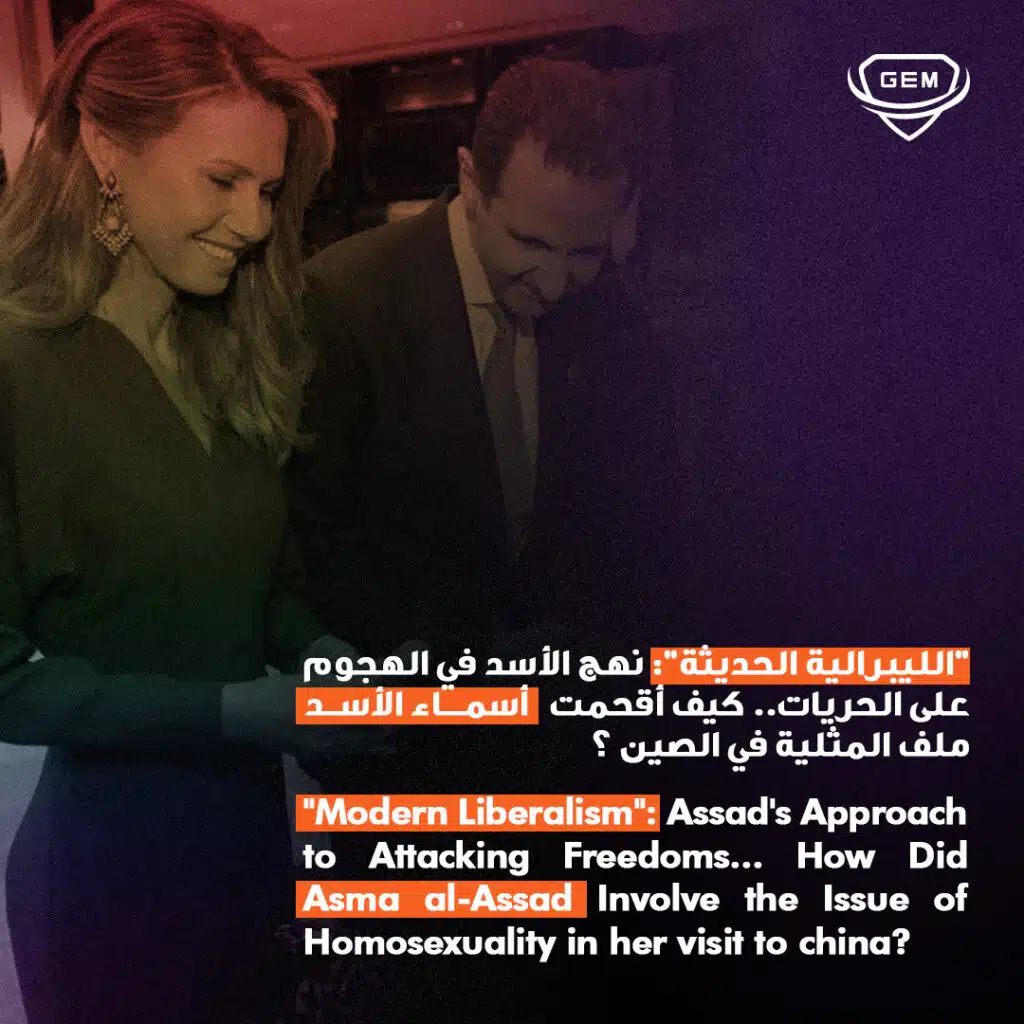As part of a systematic strategy by the Syrian regime, Asma al-Assad recently targeted the LGBTQIA+ community, considering it the cornerstone of “modern liberalism.” In an attempt to portray LGBTQIA+ individuals as a weapon created by the West to threaten values and ethics in society, she made these remarks during a speech to university students while visiting China. She accused “modern liberalism” of “tampering with human beings” and creating a “third gender.”
Asma al-Assad’s statements align with the approach initiated by Syrian President Bashar al-Assad, which involves criticizing Western freedoms and laws as a conspiracy led by “modern liberalism,” negatively impacting the values and ethics of society. In her recent speech, the wife of the Syrian President referenced LGBTQIA+ issues in an attempt to employ this issue within the same framework, aiming to achieve both domestic and foreign political objectives, which could potentially lead to increased repression against LGBTQIA+ individuals in Syria.
LGBTQIA+ issues and “modern liberalism” in Bashar al-Assad’s approach to addressing conservatives:
The term “modern liberalism” first gained attention when Syrian President Bashar al-Assad used it in 2020 in front of religious leaders in the Ottoman Mosque in the capital, Damascus. At that time, Assad criticized Western laws and freedoms, accusing “modern liberalism” of promoting moral decay. This reference was used by pro-regime media to explain the term “modern liberalism” and link it to LGBTQIA+ issues.
Similarly, during his attendance at the Arab League summit held in May of this year, al-Assad renewed his attack on what he calls “modern liberalism,” which he claims aims to strip individuals of their innate identities, ethics, and identities.
Asma al-Assad Supports Her Husband: What Are the Messages and Objectives?
In July of this year, Asma al-Assad visited Moscow to celebrate her son Hafez’s graduation and his receipt of a master’s degree from a Russian university. During her visit, she conducted an interview with Russia Today, supporting her husband’s views on “modern liberalism” and accusing the West of seeking to dissolve national, human, and moral identities that preserve social cohesion in the East.
The final chapter of Asma al-Assad’s rhetoric was when she spoke in front of foreign studies students in the Chinese capital, Beijing. She stated, “Just as they tamper with human sexuality, creating a third gender, they also tamper with language, creating a third gender in it. Both actions are at the core of modern liberalism, shifting from ethical norms to promoting deviant and divergent concepts that contradict human nature.”
Asma al-Assad’s statements in Moscow and China convey several messages and objectives, with the most prominent including:
1. Exploiting social issues to divert attention away from internal crises, particularly amid ongoing protests in the Syrian streets, especially in Suwayda, alongside economic pressures and living conditions. It appears that her attempts to highlight this issue serve as a means to divert attention from these crises affecting the country.
2. Attracting the support of religious leaders and the conservative segment, which constitutes a significant portion of Syrian society.
3. Integrating with neighboring countries and allies, portraying the Syrian regime as a defender of Eastern values and culture. This alignment with the speeches of the Russian President and the anti-LGBTQ+ sentiment in Russia, along with a public stance consistent with the campaigns of religious leaders and figures in Iran, Iraq, and Lebanon, carries political cover aimed at the LGBTQIA+ community.
4. Cementing the conspiracy theory, considering LGBTQIA+ issues as Western attempts to “tamper” with humanity, and linking this issue to language and culture. This tactic has been successful in garnering support and endorsement for the ruling family’s agenda.
5. Additional media coverage, as raising this issue served its purpose for Asma al-Assad during her visit to China alongside her husband.
Asma al-Assad’s handling of this issue illustrates how governments employ media and cultural policies to shape public opinion. It also underscores the importance of understanding political and media tactics, as they can play a significant role in assessing the impact of events on the future of sensitive social issues in the Middle East region.

